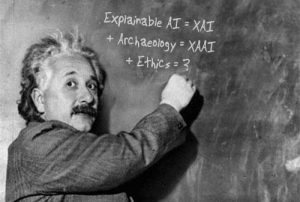
Some time ago, I suggested that machine-learning systems in archaeology ought to be able to provide human-scale explanations in support of their conclusions, noting that many of the techniques used in ML were filtering down into automated methods used to classify, extract and abstract archaeological data. I concluded: “We would expect an archaeologist to explain their reasoning in arriving at a conclusion; why should we not expect the same of a computer system?”.
This seemed fair enough at the time, if admittedly challenging. What I hadn’t appreciated, though, was the controversial nature of such a claim. For sure, in that piece I referred to Yoshua Bengio’s argument that we don’t understand human experts and yet we trust them, so why should we not extend the same degree of trust to an expert computer (Pearson 2016)? But it transpires this is quite a common argument posited against claims that systems should be capable of explaining themselves, not least among high-level Google scientists. For example, Geoff Hinton recently suggested in an interview that to require that you can explain how your AI systems works (as, for example, the GDPR regulations do) would be a disaster:


